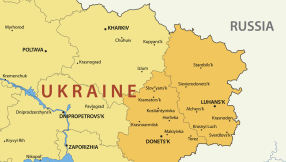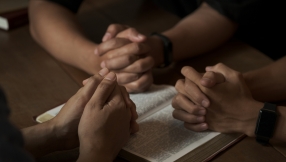Christians around the world who have been praying for Burma have been warned against euphoria over reform, while Christian and Muslim minorities remain under attack by the military.
March 10 marked the 16th anniversary of the Global Day of Prayer for Burma, which celebrated some progress towards reform, but warned that grave issues remained, especially the continuing attacks against the Kachin and Rohingya ethnic and religious minorities.
The Day of Prayer followed a new report claiming government troops have destroyed 66 churches in Kachin State in the north of Burma, on the border with China and India. The report, by the Kachin Women's Association of Thailand (KWAT), also claimed the military are using rape as a weapon of war. It said the Burma army had set fire to churches after the collapse of the ceasefire in Kachin State in 2011. A recent report by Amnesty International has condemned air-strikes against the mainly Christian Kachin.
Hkanhpa Sadan, the Joint Secretary of the Kachin National Organisation, told the prayer event in London that up to 100,000 Kachin have been driven from their homes. 75,000 had sought shelter in temporary camps along the China border. He criticised the UN for failing to bring in relief aid and said: "The people are living on rice and salt – that is the only nutrition they can get. The UN is not pushing hard enough to bring in humanitarian aid."
He described the attacks as religious persecution: "When the Burma army come to the villages, they torch the churches but don't touch the pagodas."
He told World Watch Monitor: "They want us to be Burman, to be Buddhist, and to follow their orders."
The mainly Christian Kachin are seeking autonomy within Burma, and say they are attacked for being both separatist and Christian.
Hkanhpa Sadan was sceptical about the claim that widespread reform is taking place in Burma: "We don't see this as genuine. In Kachin State we haven't seen reform at all. All the reforms seem to be centred on Rangoon and Mandalay, and aimed at the Burman [tribal] majority."
He went on to accuse President Thein Sein of "lying" over claims that he has ordered a ceasefire in Kachin State: "He is the head of state and head of the army. He is the only Burmese leader ever to use fighter jets against the Kachin. Rather than rolling out the red carpet for him, the international community should send him to The Hague to be indicted for crimes against humanity. He is above the law and using the promise of reform just to get his authoritarian democracy. It is all about power. I pray that he will change his mind and have a genuine desire for peace."
Ben Rogers, chairing the Global Day of Prayer in London on behalf of Christian Solidarity Worldwide (CSW), was also sceptical about Thein Sein's ability to deliver a ceasefire. "Either he is not telling the truth about calling for a ceasefire in Kachin state," he told World Watch Monitor, "or other powers [in the army or the regime] are overruling him.' Mr Rogers believed the continued fighting could not be put down to a rogue element in the army beyond presidential control. 'For air power to be used, that has to be authorised at a high level."
Amnesty International has confirmed three civilians were killed in an airstrike in January against the Kachin town of Laiza, on the border with China. Laiza is the headquarters of the Kachin Independence Army. Burma has acknowledged carrying out the air strikes, but says they were necessary to prevent rebels cutting off military supply routes. Amnesty has criticised the Kachin for positioning potential military targets near civilian areas but has accused the army of committing "multiple human rights violations against Kachin civilians, including extrajudicial executions, torture and other ill-treatment, arbitrary detention, forced labour and sexual violence".
British parliamentarian Baroness Cox, the founder of the Humanitarian Aid Relief Trust (HART), has just returned from Kachin State. She told the BBC on March 8: "We saw the Burmese army attacking civilians. There are 156 battalions of Burmese army in that one state. They are bombing civilians and committing atrocities. It is heartbreak land. It is terror." Baroness Cox confirmed that troops were raping civilians.
Another of Burma's largely Christian groups, the Chin, is also facing persecution. Mr Rogers said: "The regime is continuing to use military-run Buddhist monastic schools, where they take Chin children from Christian families, with the promise of an education, but force them to convert and become novice Buddhist monks. This is the practice of the regime, not of ordinary Buddhists," he added. "Until there is true religious freedom for all there is no freedom in Burma."
But the most extreme religious persecution in Burma is taking place against the Rohingya Muslim minority in Rakhine state, the Day of Prayer was told. Jarmal Ahamed, General Secretary of the Burmese Rohingya Organisation UK, said: "Since June 2012 more than 5,000 Rohingyas have been killed, some burned alive. Homes and mosques have been destroyed, hundreds of women and girls have been raped, often in front of family members, and 140,000 have been forced to leave their homes. Many have nothing to eat, nowhere to go, and are dying of hunger and disease."
That conflict is often portrayed as inter-communal violence between the Rohingya and Rakhine tribes; the former Muslim, the latter Buddhist. But Jarmal Ahamed described the attacks as "state organised and sanctioned, backed up by the federal government".
Hkanhpa Sadan, of the Kachin National Organisation, said non-Buddhist religious minorities were being deliberately targeted under a policy of Burmanisation. "Their motive is 'one nation, one command'. They want us to be Burman, to be Buddhist, and to follow their orders," he told World Watch Monitor.
While people around the world were praying for Burma, the National League for Democracy (NLD) was holding its historic first Congress in Rangoon. In a recorded message to the London event, U Tin Oo, the Deputy Leader of the NLD acknowledged: "There are still tangible violations of human rights along the border region. The victims are facing great damage and devastation [and] do not have access to food and shelter. Conditions there are gradually deteriorating."
U-Tin-Oo, a former commander-in-chief of the Burmese armed forces and a Buddhist, said: "I do pray with you for relief and a remedy to cure the great poverty [of these] helpless refugees."
But the event heard criticism that the NLD and specifically its newly-re-elected leader Aung San Suu Kyi was not doing enough to help the persecuted ethnic and religious minorities. The opposition leader took a seat in Parliament after by-elections in April 2012 and is widely expected to be voted in to lead the country in the presidential elections in 2015. She also first initiated the annual Global Day of Prayer for Burma in 1997.
"Aung San Suu Kyi has been a disappointment," said Hkanhpa Sadan, of the Kachin National Organisation. "She was our only hope. But she has failed to speak up for the ethnic minorities, failed to visit the refugees. She is afraid of offending the army and has one eye towards the elections in 2015. Our message to Aung San Suu Kyi is 'Please help us. Use your liberty to speak up for us.'"
Burmese president Thein Sein has been in Europe in a quest for international legitimacy and on March 4 appealed to the EU to lift remaining sanctions against his country. Europe has already suspended all non-military sanctions for a year. But Baroness Cox is adamant that sanctions must remain in force. She told the BBC that Thein Sein's visit to Europe was for 'propaganda' purposes, and the international community risked turning a blind eye to injustice because of the desire to trade with Burma, which is rich in resources. She continued: "Do not lift those sanctions until there is peace, justice, equality and freedom for all the peoples of Burma."
In a specially written prayer for the Global Day of Prayer, the Catholic Archbishop of Rangoon, Charles Maung Bo, said: "We pray that Myanmar [Burma] becomes a land whose future belongs to her sons and daughters and not to outsiders, the business makers, the peace-makers and the hundreds of NGOs... We pray for a nation built on compassion and mercy, justice and peace."
London event organiser Ben Rogers described the Day of Prayer as a success: "Our aim was to help people see that Burma still has many challenges, and while it is right to give thanks for the signs of hope, there is a danger of premature euphoria. The situation in Kachin is extremely serious and we must redouble our prayers for Burma to have genuine freedom and peace. For that to be permanent, it must turn into a peace process, a meaningful political dialogue that leads to a lasting political solution for Burma's ethnic nationalities."
Source: World Watch Monitor













